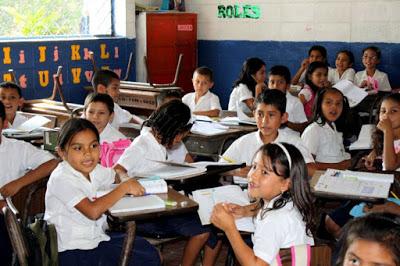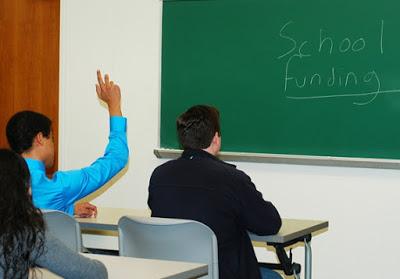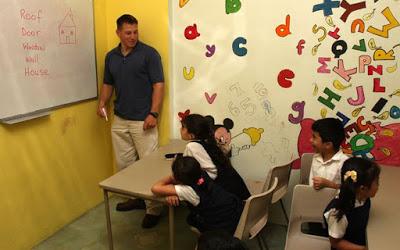In this post, I want to look at different school scenarios and try to give guidance on three issues;
- Private versus State-Funded
- Special versus Mainstream
- Homeschooling versus Institutionalised

Private versus State-Funded Schools
Understanding Public and Private Schools
While these two major types of schools appear all around the world, they're called different things in different countries. In the UK, the word "public school" actually means "independent" (essentially what a "private school" in Australia and the United States means). They use the words "state-funded" to describe what we call public.As an aid to understanding, I'll be using "state-funded" instead of public here but I'll define my terms just in case;
- State-Funded School - FREE for all students
- Private School - Expensive and often elitist, these can be specialised academic institutions, church-related (Catholic or Jewish schools) and culture related (Japanese schools). Sometimes they are boarding schools as well.
Which is most Suitable?
Both of my kids went to a Catholic school. We're not a terribly religious family but my wife and I met at a Catholic school and we felt that one of the main reasons that we've stayed together all of these years was because we shared similar values. We felt that our kids had a better chance of finding friends with similar values simply by learning among a restricted segment of the population. I still think that it holds true.A lot of people told my wife and I that state-funded schools were better resourced when it comes to special needs children. This was particularly tempting when we reached parts of their education in which they struggled -- and the school struggled to provided for their needs.
We spent some time investigating state-funded schools only to discover that support varied from one school to the next and that resourcing and budgeting was always a problem for them.
The schools with fewer special needs students often had better resources but appeared to be less welcoming, probably because they viewed us as a drain on their resources. The ones that had lots of special needs students seemed to be driven by loving staff members but were "drowning" in a lack of time and resources.

We talked to them about how many hours per week our kids could reasonably expect one-on-one help and what other accommodations could be made. It didn't take us long to discover that what we already had in the private school was better than anything that the government could provide.
The verdict: If you can afford a private school, you'll often get marginally better support and services. As private schools depend on funding from parents, they're much more responsive to parental input. Even then, your child won't get enough one on one time with the teacher and may thrive with an after-hours personal tutor. If it comes down to a choice driven by your family budget, go with a state funded school and use any extra funds to hire a tutor.
Unfortunately all schools function only as well as their principals, their special needs staff and their boards of directors. If these are not aligned in your favour, your child simply will not benefit.
Special Versus Mainstream Schools
Full disclosure; I have a real problem with special schools. The issue is simple;By being special, these schools agree to focus on the "difference". Unfortunately, there is no single difference that makes all children "alike". Even deaf or blind schools can't assume that all of their pupils will have the same level of function -- so you can imagine how difficult it would be for a special needs school to address the needs of children on the spectrum with a wide variety of co-conditions.
Ultimately, special needs schools are faced with choices. They have to set divisions and segment their kids into groups according to their perceived abilities.
Place someone with lower abilities, for example a barely verbal child, in a classroom full of higher ability, non-stop Asperger's talkers with intense special needs and an inability to keep quiet and that child's voice will be lost among the chaos.
Do things in reverse and you place restrictions on the development of more enabled children.
You can't win.

The solutions that many special needs schools opt for is to have "intellectual" divisions between classes and to sort kids according to their abilities and needs. This works but it doesn't allow for kids to change and grow -- and some kids on the spectrum greatly increase their capabilities as they mature.
The verdict: If you can get away with a mainstream school over a special school, then do it. After all, your kids won't have the dubious "benefit" of segregation in other areas of their life so it's better that they learn to cope while they have the support structure of school in place. On the other hand, if your child is struggling academically in the lowest levels of their mainstream school, then it's a fair bet that they'll be happier in a special school where the pressures of grading is less evident.
It's always been my belief that it's better to be somewhere towards the bottom end of a good class than to be at the top of a bad one.
If you have a child who is doing well academically but can't cope socially, I'd still recommend avoiding special schools and persevering in mainstream school. If it all gets too much, homeschooling could be a better choice for the gifted child.
Homeschooling versus Institutionalised Schools
Before proceeding, I want to define "institutionalised"; it simply means "normal" schools conforming to the "normal" system. I just try to avoid the word "normal" when I can.To be fair, under "perfect" circumstances, homeschooling provides the best option for any kind of schooling from both an academic and a social standpoint.
The main problem with homeschooling is that "perfect" circumstances usually aren't possible and you need to decide if the compromises you have to make are in the best interests of you, your child and the rest of your family. When it's done right, homeschooling isn't "a walk in the park"- it's very hard work.

So, having said that homeschooling is the best option, lets look at the reasons why you might choose to NOT home school;
- If you're doing this for yourself, rather than your child. -- It's not uncommon for single parents to combat loneliness by homeschooling.
- If you're doing it because you're a helicopter parent -- One of the main aims of education is to allow your kids to flourish on their own. In order to do this, you'll need to be able to trust them to do their homework, sports and shopping by themselves. If you're homeschooling because you can't let them out of your sight, then you're homeschooling for the wrong reasons.
- If you don't feel like you can put in the required time -- Homeschooling shouldn't be a 24x7 operation and in a less structured day, you can take breaks at odd times but if you're planning to home-school by watching TV while your child works in the other room, then either get a tutor or consider a different approach.
- If you're time-poor -- Following on from the previous point, if you're working a full-time job during the home-schooling hours, then don't home-school.
- If you don't feel up to the task -- Nobody expects you to be a college professor but you do at least need to feel confident that you can help your child with their work. If you can't keep up with the work, home-schooling is not for you.
- If you're a social pariah -- Society forms an essential part of good home-schooling and this means that your child should accompany you on "excursions", take part in sport (with their peers) and generally interact with other people, for example at the shops. If you're home-schooling with the intention of "protecting your child" from social interaction, then you're doing it for the wrong reasons.
At the end of the day, there's no education system that will be "perfect" for every child. You should feel free to experiment in the early years but once your child is half-way through their schooling, what they'll be craving is stability and making changes that cost them friendships could be worse than not making changes.
Unless there are serious issues, such as bullying, try not to change schools after they hit about 15 years of age. If they're struggling academically there are two options,
- Throw more resources at them (ie: get a home tutor for after-hours)
- Reduce their workload and allow them to get more enjoyment out of school rather than stressing out about work that may be "out of their league" -- not everyone needs to be a university graduate.

